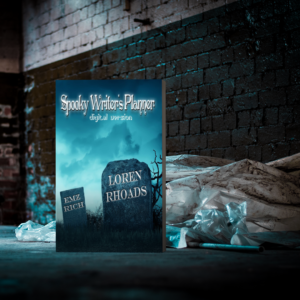This article is entirely members-only content….
Angel
When you’re ready to create your own website, you will want to rent a domain name for it. A domain name is the URL people will use, the address of your website, such as WilyWriters.NET or AngelMcCoy.com or Google.com. That is a domain name.
First, you want to make sure you’re not infringing on anyone’s copyright, so do a Google search on it. For example, a domain name like Thumper.com is going to infringe on Disney’s copyright, and they love to sue. Use your best judgment on this.
Good domain names:
- Your author name with no dashes or spaces
- The title of your series
- The name of your world
Less good domain names:
- The name of your novel – you want a domain name that will have longevity and you absolutely don’t want to be paying for a new one with every book you publish. You are renting the URL, so you will be paying a monthly/annual fee for as long as you have it.
- Anything unrelated to your work. Remember your branding. What small phrase do you want people to remember you by. It’s probably not PartyGirl1973.com or BobbysMom.com, unless that’s the name of your series or the author name under which you’re publishing.
Visit a site that licenses domains. I have personal experience with and recommend these sites, in this order:
On their homepages, you’ll find a search field where you can test your chosen domain name and see if it’s still available. You may have to try several before you find one that’s free.

| NOTE: If you’re building your website on a full-service site like Wix, Squarespace, or WordPress.com, then you can purchase your domain name there. I’m not sure what they charge, but it will be more convenient for you. You don’t have to buy it with them, though. You can purchase it at Doteasy or any other site like that and use it at Wix, Squarespace, or WordPress.com. |
Did you know that you can post your newsletter in public forums, such as your social media accounts? You can, and it’s a great idea to do this occasionally.
You can even create a special edition of your newsletter for the public, especially if you don’t want to share exclusive content that wide. This can be especially effective around the launch of a new book.
One of the most challenging aspects of getting traditionally published is finding an agent. There are realities that are difficult to face when it comes to agents. For example:
- They are very picky.
- They may reject you with a snap decision that has nothing to do with the quality of your work.
- They’re not in it to help you. They’re in it to help themselves, and you get to come along for the ride.
- There are bad agents, dishonest agents, and lazy agents.
- Many agents have a boss to whom they report, and they don’t always make the decisions themselves.
- There are many, many, many authors besides you knocking on the agent’s door.
- Quite often, the search for an agent can take a year, two… or more years. You have to be patient.
It is very easy to get discouraged. The benefits of having an agent are plentiful, once you acquire a good one.
This topic is so huge, so let’s start with the basics of what you need to know to find an agent.
Wilies, if you see anything here you think I got wrong, please do correct me in the comments. I gave up on finding an agent after a year of trying (no more patience). However, I did do a load of research. Having said that, I’m human. Correct me, please.
- Before you contact any agent, your book needs to be completely done and edited. If they ask for your book, it has to be ready to send immediately or you miss your window of opportunity.
- Agents won’t help with your marketing. That’s not their job, and so they’d be no good at it. Their job is to sell your book to domestic and foreign publishing houses or a film company and to make sure the ensuing contract protects you and gets you the best deal. The publishing house pays the agent directly, then they take their cut of the profits and pass the rest on to you.
- If an agent asks for a deposit or money from you, something is wrong. Look closer with suspicious eyes. Most agents won’t do this.
- Many of the big publishing houses won’t deal directly with authors, which is why agents are still necessary. The agent is the filter for quality between the publishing house and the dirty masses. 🙂
- The publishing house is the one that helps with the marketing, but they will only market your book if they’re publishing it. Also, you will have very little control over how your book is marketed once the house buys it.
- The publishing house will make the cover for you if they’re publishing the book. This is pretty non-negotiable. They may or may not give you a chance to suggest changes to the one they come up with. When you go traditional, you are giving up a lot of your control over what happens to the book once you’ve contracted it to a publishing house.
Here’s the basic step-by-step process:
- Write and rewrite your query letter. Share it with writer friends and get feedback. It wouldn’t hurt to have your editor look over your letter as well because you will be judged by it.
- Find agents you fit with (start with 6). There are links below to sites where you can search.
- Put the info for the ones you think are good for you in a spreadsheet. Make a list. You can download the following:
- Spreadsheet I used (Excel), filled out with the agents I was querying.
- Same spreadsheet, blank, for your use.
- You can take a look at the agencies and agents listed on my spreadsheet to see if they take the kind of books you’re writing. They will say what they’re seeking. This is a good place to start familiarizing yourself with agency websites and how they work.
- On my spreadsheet, I rated the agents, giving them a point each for:
- whether they specifically called out my genre in their profile
- whether I felt they fit with me personally (for me, this meant they mentioned gaming or some other nerdy pursuit)
- whether they were with a respected agency
- whether they were new or had experience in the publishing industry
- whether they had an author they were representing who wrote books like mine
- Sort the list and start with everyone who is a 5 or above. Send out at least 6 query letters in the first round—as many as you can wrangle.
- Keep researching and adding people to the list while waiting.
- When an agent rejects your book, send a query letter out to the next person on the list. And so on and so forth. This is the process.
Researching Agents
Look up every agent online and try to find their agency website. Check there to make sure the information you have is up-to-date. They may not be accepting submissions, and the agency website will have the most accurate information.
- Wilies have found these sites useful and up-to-date for researching agents. Always confirm what you find on a site like these at the literary agency or agent’s website. These sites rely on the agent to maintain their record, so they can go out of sync with reality fairly quickly.
- https://www.publishersmarketplace.com/ (Search on your genre to find agents who are looking for works like yours.)
- https://www.agentquery.com/default.aspx
- Query Tracker (track your query and also find agents)
- Manuscript Wish List (find agents looking for your type of book)
- Manuscript Wish List Twitter Hashtag #MSWL (agents post what they’re looking for)
While you’re at that website, look for the agent’s submission guidelines. They all have different ones. Some want you to email. Some want you to use their online form. Etc. Remember to add this link to your spreadsheet so it’s easy to find when you get ready to send a query to this agent.
Also while you’re at their agency’s website, look at the other agents employed there to see if any of them will fit well with you.
Waiting for replies can be challenging and nerve-wracking. Your self-confidence may take a hit, but don’t let it! Every agent is different. Some reply immediately. Some take 6-12 months to reply (not a typo). Some never reply. It will say in their guidelines how quickly you can expect a reply. This is also good information to input into your spreadsheet for future convenience.
Never send your manuscript unless they ask for it. And always send it in exactly the format they ask for. Do not snail mail (US Post Office) anything to anyone unless they’ve specifically requested it. You’ll be wasting postage and your time.
An agent may request to see a partial (a certain number of pages) or full copy of your manuscript. Don’t do anything fancy, just follow their instructions to the letter. They are looking for any excuse to get you off their desk and out of the way of the other 3000 manus waiting for their attention. Don’t let the fact that you used the wrong font annoy them into dropping you in the reject pile.
If they want to represent you, they’ll let you know. After that will come a round of revisions from their editor and a contract that you’ll want to have a good lawyer explain to you.
While you’re doing all this, keep working on your next book. Finding an agent is a long process and could take a year or more.
| If you post your manuscript in a public forum or on your website, it’s considered “published.” Many agents won’t want to represent a previously published work (reprint). |
Some Tips
- Things you can do to improve your chances:
- Do not wait until you have an agent to get serious about your writing. That’s not how this works.
- Write a really kickass query letter.
- Nail down your brand. Figure out what it is and how you want to present yourself. It is not your agent’s job to come up with that for you, though many will help. If you have it already honed (but remain open to their suggestions), then you’ll seem more professional.
- Get good author photos taken. Professional ones, not the one where your ex’s arm is visible around your shoulders. Use this pro author photo on your website and social media platforms.
- Keep writing. If you can tell an agent that you have other books planned, in progress, or (best) done, then they may be more interested. Do NOT stop writing while you wait to find an agent for the first book!
- Publish other material, such as short stories, novelettes, novellas, and even self-published novels if you have them, etc. This will show that agent you’re not a one-hit-wonder and that you’re serious.
- Set up your author platform. This means:
- website
- mailing list
- professional Facebook page (and maybe groups)
- Goodreads Author Page
- Twitter account
- Whatever social media you want to employ to promote yourself
- An agent will be far more attracted to a writer who is professional and serious about a career as a writer than one who is dabbling or unsure. If you’re either of those latter things, then consider going straight to self-publishing instead. An agent is investing in you and your career, and they want to know you’re not going to disappear after the first publication.
- You never know which agents talk to each other behind closed doors, so don’t burn any bridges with juvenile behavior.
- I’ll repeat, if the agent wants to charge you any kind of reading fee or deposit, walk away. Honest agents get ~15-20% of the money when you sell the book, and nothing before that. You never have to pay an agent upfront. If they want that, they’re scammers.
- Once you find an agent you want to query, you can follow them on Twitter and watch their activity there to see if you feel they’re a good fit. You may be working closely with this person for many years, so be sure you trust and like them.
- Consider joining a professional organization relative to your genre (you’ll find information specific to your genre there, and you can start mingling with other writers in your genre):
- Go to conventions where they’re offering pitches or Speed-Pitching events. These are a great opportunity to meet your agent-soulmate. (Practice your elevator pitch in advance so you know it by heart.)
- Do be discriminating. If an agent makes you uncomfortable, listen to your instincts. It’s a pain in the ass to fire an agent. Make sure the one you commit to is the right one for you.
- This is a good blog to read: http://www.publishingcrawl.com/. Also follow them on Twitter: https://twitter.com/PubCrawlBlog
- It used to be that you wanted an agent located in New York, but this is no longer necessary. Feel free to consider agents located anywhere.
- If you personally know any authors who have agents, contact them and see if they’d be willing to introduce you, then do everything in your power not to embarrass them. Since I decided to go indie, I don’t have an agent, so I can’t help you with that.
❖ Other Research
Here are some links that will help you understand the process:
- https://www.writersdigestshop.com/how-to-get-published/find-an-agent (Writers Digest releases annually, and has up-to-date info; it’s renowned; their magazine is good too)
- https://nybookeditors.com/2015/12/how-to-write-a-darn-good-query-letter/
- https://www.janefriedman.com/query-letters/
- https://player.fm/podcasts/Literary-Agents (a list of podcasts that could help. You can find them on iTunes probably as well, or wherever you get your podcasts)
- https://www.writersdigest.com/podcasts/writers-digest-podcast/the-writers-digest-podcast-episode-7-ask-the-agent-interview-with-barbara-poelle (good information)
- The Query Shark (help/feedback for your query letter)
❖ In Conclusion
You will get rejections. Possibly lots of them. Many of them cold-ass form letters. And it has nothing to do with the quality of your writing. You are looking for that spark of magic that means your timing was perfect, the agent was in the right mood to connect with your story, and they managed to get it approved by their bosses.
It’s not unlike dating.
Finding an agent is complex, and most of the process you won’t even see as they’re considering your book. There are tons of reasons they might reject it. So, no matter what, do not give up too soon. Keep going. And if you decide you want to give indie publishing a go instead, let us know here at Wily Writers. We’re glad to help with that too.
The following ad will appear in the August 2021 issue of the Horror Writers Association newsletter as part of our Wily Writers Group Promotions Project! Thanks to a generous donation from a wily member, we were able to purchase two full-page ads. This is the second one. You can view the July 2021 ad here.

RABARTS/MURRAY ❖ RHOADS ❖ MCCOY |
||||||||
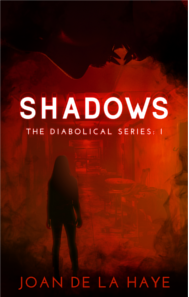
|
(Book #1 of the Diabolical series) What if you thought you were losing your mind? “If you’re open to reading a book that is genuinely disturbing, in some cases distasteful, and creepy as hell, then I’m pretty sure you’ll ‘enjoy’ Shadows.” – Dave de Burgh, author of Betrayal’s Shadow
|
|||||||
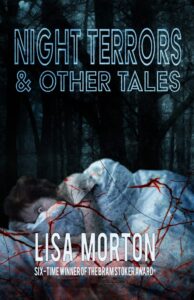
|
by Lisa Morton (short story collection) This is the first major collection to gather together twenty of Lisa Morton’s finest short stories (chosen by the author herself). During a career that has spanned more than three decades, she has produced work that has been hailed as “consistently dark, unsettling, and frightening” (the American Library Association’s Readers Advisory Guide to Horror). If you’ve never encountered Lisa Morton’s work before, you’ll find out why Famous Monsters called her “one of the best writers in dark fiction today.” If you’re already a fan, this collection will offer up a chance to revisit these acclaimed and award-winning stories.
|
|||||||
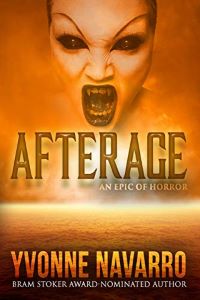
|
(published by Macabre Ink) A plague of vampirism has crept across the country, reducing once-thriving cities to ghost towns. In Chicago, a few scattered survivors hide behind the fortified walls of office buildings and museums, raiding deserted stores for dwindling supplies of clothing and food. Meanwhile a hungry vampire population also struggles for survival as their prey grows scarce, forcing them to capture alive the last remaining humans as breeding stock for the blood farms that will ensure their future.
|
|||||||
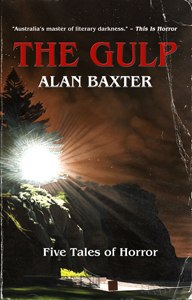
|
(published by 13th Dragon) The isolated Australian harbour town of Gulpepper isn’t like other places. Some maps don’t even show it. And only outsiders use the full name. Everyone calls it “The Gulp.” It has a habit of swallowing people.
Five novellas by Alan Baxter. Five descents into darkness. Welcome to The Gulp, where nothing is as it seems. |
|||||||
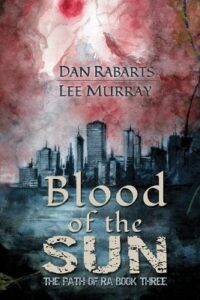
|
by Dan Rabarts and Lee Murray (The Path of Ra, book 3, published by Raw Dog Screaming Press) There’s been a gang massacre on Auckland’s Freyberg Wharf. Body parts everywhere. With the police’s laboratory out of action, it’s up to scientific consult Pandora (Penny) Yee to sort through the mess. It’s a hellish task, made worse by earthquake swarms, insufferable heat, and Cerberus’ infernal barking. And what’s got into her brother Matiu? Is Matiu running with the gangs again? If he’s involved, Penny will murder him herself. Join Penny and Matiu Yee for the family reunion to end all family reunions, as the struggle between light and dark erupts across Auckland’s volcanic skyline. |
|||||||
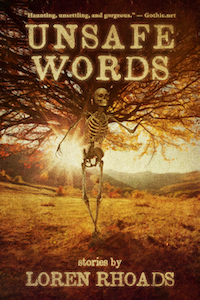
|
(published by Automatism Press) In the first full-length collection of her edgy, award-winning short stories, Loren Rhoads punctures the boundaries between horror, dark fantasy, and science fiction in a maelstrom of sex, drugs, and rock-n-roll. Ghosts, succubi, naiads, vampires, the Wild Hunt, and the worst predator in the woods stalk these pages, alongside human monsters who follow their cravings past sanity or sense. The stories are drawn from the pages of the magazines Cemetery Dance, City Slab, Instant City, and Space & Time, the Wily Writers podcast, and the books Sins of the Sirens, Demon Lovers, The Haunted Mansion Project: Year Two, Tales for the Camp Fire, and more. |
|||||||
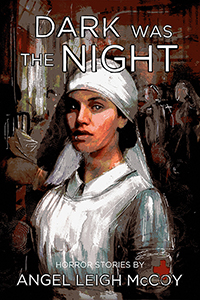
|
by Angel Leigh McCoy (published by Wily Writers LLC) The horror stories in this collection take you deep into lives touched by darkness. Herein, you’ll meet a grandmother with a knack for storytelling, a little girl caught in a lightning storm, and a medical intern who learns the true meaning of family–the hard way. At times gory, very often moody and intense, these tales reveal a truth about our world: evil exists, and love persists. |
|||||||
|
|
||||||||
Bookfunnel is a website that lets you create landing pages with download links for various uses.
You can use it to distribute free promotional stories, ARCs, and even a free copy of your work. They make it easy for both you and your readers. No more lost emails or other weirdness.
For example, use it to easily (and attractively):
- Distribute advanced reader copies (ARCs) to people you specify.
- Give out a free copy of your work in exchange for signing up for your newsletter.
- Setting up sales link pages that you can share with limited or broad audiences so people purchase your book. (A great alternative to making your own web pages for each book.)
- Providing an e-copy to reviewers.
- Viewing tracking data for the page, so you can see exactly how many people have downloaded the work.
You can view an example page for one of my freebie short stories. This one requires an email sign-up, but you can also set it up so it doesn’t require anything.
It does many other things as well, including:
- Connecting you with other genre-specific writers for promotional events, giveaways, and newsletter swaps.
- Posting a sample of your audiobook so you can easily share it with your readers in your newsletter or elsewhere. Great for pre-launch promotion teasers.
- Have your ARC readers sign up, and Bookfunnel will send them your ARC with a unique link that only works for them. They will then track whether the ARC was downloaded or not for you.
Bookfunnel is extremely affordable relative to the great service it provides. At the time of this writing, the most basic account is only $20/year, which is less than $2/month. To get all the features I mention above, it’s $100/year (less than $9/month).
Let me know in the comments if you’d like me to do a walk-through video of Bookfunnel for you.
Tips on Reviewers
Reviews can boost your sales if they’re good. If they’re bad, they can hurt your sales. Requesting a review is a risk worth taking.
- Don’t be shy about cold-contacting them.
- Look to see if they’ve posted review guidelines on their website (many have), and if so, follow them to the letter.
- Familiarize yourself with their reviews so you know whether they’re in sync with your style.
- Maintain a list of which ones you’ve contacted. Wily Writers has created an Excel spreadsheet for you to download, customize, and use: Wily Writers Reviews Tracker
- Over time, you’ll build a list of trusted reviewers who enjoy your work and recognize your name. You might consider sending hard copies to these reviewers.
- If sending to a reviewer who requires a hard copy (some places do), don’t expect any more from them. They may or may not actually do a review, and it may or may not be positive.
- It’s okay to send advance-reading copies (ARCs) of your book to reviewers even if your book is out—unless you made extensive revisions to the final version.
- Do share the review via your social media once it’s live. Share and share again later. This helps both you and the reviewer.
- Let Wily Writers know if you got a good review, and we’ll post about it in our public newsletter.
Etiquette
- Be on your most professional behavior with all reviewers.
- Remember that reviewers receive a TON of requests, so don’t be surly with them if they don’t review your book. Never let them see you sweat.
- Make it clear up-front that you’re offering an ebook version of your book if you’re not willing to send a hard copy. To make it easier on them, include a link to the download in your email to them. An excellent site for setting up a free download of your ebook is Bookfunnel.com.
- Never argue with a reviewer who has given your book a negative review, especially not in public. Bad juju.
- Never publicly berate a reviewer who has given your book a negative review. Burning bridges burns you more than them.
Why not share your good news with your fellows and the world at large? Fill out the form linked below, and we’ll add your announcement to the Wily Writers’ private and public newsletters and to the Wily Facebook page. We want to brag about you!
What constitutes good news? So many things!
- a novel launch
- a short story, novelette, or novella sale
- publication of the work you sold
- receiving an award
- scheduling an event
- publishing a workshop or course
- being a guest/panelist at a convention
- or even a big life event — marriage, new baby, graduation? So many things.
Every month, the Wily Writers Book Club reads a new dark fiction selection then discusses it in a Zoom meeting that we’ll record and post on the Wily Youtube channel.
We’ll schedule these in advance and all are welcome to attend. Check here for dates and times.
October’s Selection:
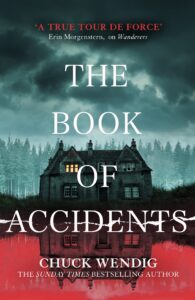
The Book of Accidents by Chuck Wendig
A family returns to their hometown – and to the dark past that haunts them still – in this masterpiece of literary horror by the New York Times best-selling author of Wanderers.
“The dread, the scope, the pacing, the turns – I haven’t felt all this so intensely since The Shining.” (Stephen Graham Jones, New York Times best-selling author of The Only Good Indians)
Long ago, Nathan lived in a house in the country with his abusive father – and has never told his family what happened there.
Long ago, Maddie was a little girl making dolls in her bedroom when she saw something she shouldn’t have – and is trying to remember that lost trauma by making haunting sculptures.
Long ago, something sinister, something hungry, walked in the tunnels and the mountains and the coal mines of their hometown in rural Pennsylvania.
Now, Nate and Maddie Graves are married, and they have moved back to their hometown with their son, Oliver.
And now what happened long ago is happening again…and it is happening to Oliver. He meets a strange boy who becomes his best friend, a boy with secrets of his own and a taste for dark magic.
This dark magic puts them at the heart of a battle of good versus evil and a fight for the soul of the family – and perhaps for all of the world. But the Graves family has a secret weapon in this battle: their love for one another.
Chuck Wendig is the New York Times and USA Today bestselling author of Star Wars: Aftermath, as well as the Miriam Black thrillers, the Atlanta Burns books, Zer0es/Invasive, Wanderers, and the upcoming Book of Accidents (July 2021). He’s also worked in a variety of other formats, including comics, games, film, and television. A finalist for the John W. Campbell Award for Best New Writer and the co-writer of the Emmy-nominated digital narrative Collapsus, he is also known for his books about writing. He lives in Pennsyltucky with his family. His agent is Stacia Decker, with Dunow, Carlson and Lerner.
Terribleminds is his blog where he rambles on about writing, parenthood, food, pop culture, and other such shenanigans. It is NSFW and NSFL.
Members are welcome to be part of the panel. You don’t have to be on camera, but if you are, then you will also be mentioned (with links) in the show notes! It’s an excellent (and perpetual) promotional beat for you and your works.
Come, participate, lurk, chat, and let’s discuss Silvia Moreno-Garcia’s Mexican Gothic.
Previous Discussions
July 2021 – Silvia Moreno-Garcia’s MEXICAN GOTHIC
Grab the Discussion Guide too!
June 2021 – Stephen Graham Jones’ THE ONLY GOOD INDIANS
Grab the Discussion Guide too!
Wily Writers authors read from their work.
Lisa Morton ❖ Jennifer Brozek ❖ Loren Rhoads
Lisa Morton (author, screenwriter, and Halloween expert) offers up her short story titled “Poppies” from the forthcoming podcast “Spine Tinglers”. Two friends venture out to view California’s magnificent springtime poppy fields and learn that something malevolent lurks just beneath the vibrant orange blossoms.
Jennifer Brozek reads ShadowBytes…a mosaic story told through five pieces of connected flash fiction. In addition to being a Wily Writer, Jennifer is an award-winning author, editor, and media tie-in writer.
Loren Rhoads reads a selection from her collection UNSAFE WORDS. In addition to being a Wily Writer, Loren is a cemetery expert and the author or editor of 14 books.
The following ad appeared in the July 2021 issue of the Horror Writers Association newsletter as part of our Wily Writers Group Promotions Project! Thanks to a generous donation from a wily member, we were able to purchase two full-page ads. The second one will appear in August 2021.
 BAXTER ❖ RHOADS ❖ RABARTS/MURRAY ❖ NAVARRO ❖ MCCOY BAXTER ❖ RHOADS ❖ RABARTS/MURRAY ❖ NAVARRO ❖ MCCOY |
|

|
(published by 13th Dragon) The isolated Australian harbour town of Gulpepper is not like other places. Some maps don’t even show it. And only outsiders use the full name. Everyone who lives there calls it The Gulp. The place has a habit of swallowing people.
Five novellas by Alan Baxter. Five descents into darkness. Welcome to The Gulp, where nothing is as it seems. |

|
(published by Automatism Press) In the first full-length collection of her edgy, award-winning short stories, Loren Rhoads punctures the boundaries between horror, dark fantasy, and science fiction in a maelstrom of sex, drugs, and rock-n-roll. Ghosts, succubi, naiads, vampires, the Wild Hunt, and the worst predator in the woods stalk these pages, alongside human monsters who follow their cravings past sanity or sense. The stories are drawn from the pages of the magazines Cemetery Dance, City Slab, Instant City, and Space & Time, the Wily Writers podcast, and the books Sins of the Sirens, Demon Lovers, The Haunted Mansion Project: Year Two, Tales for the Camp Fire, and more. |

|
by Dan Rabarts and Lee Murray (The Path of Ra, book 3, published by Raw Dog Screaming Press) There’s been a gang massacre on Auckland’s Freyberg Wharf. Body parts everywhere. And with the police’s go-to laboratory out of action, it’s up to scientific consult Pandora (Penny) Yee to sort through the mess. It’s a hellish task, made worse by the earthquake swarms, the insufferable heat, and Cerberus’ infernal barking. And what’s got into her brother Matiu? Does it have something to do with the ship’s consignment? Or is Matiu running with the gangs again? Because if he’s involved, Penny will murder him herself… Join Penny and Matiu Yee for the family reunion to end all family reunions, as the struggle between light and dark erupts across Auckland’s volcanic skyline. |

|
(published by Macabre Ink) A plague of vampirism has crept across the country, reducing once-thriving cities to ghost towns. In Chicago, a few scattered survivors hide behind the fortified walls of office buildings and museums, raiding deserted stores for dwindling supplies of clothing and food. Meanwhile a hungry vampire population also struggles for survival as their prey grows scarce, forcing them to capture alive the last remaining humans as breeding stock for the blood farms that will ensure their future. |

|
by Angel Leigh McCoy (published by Wily Writers LLC) The horror stories in this collection take you deep into lives touched by darkness. Herein, you’ll meet a grandmother with a knack for storytelling, a little girl caught in a lightning storm, and a medical intern who learns the true meaning of family–the hard way. At times gory, very often moody and intense, these tales reveal a truth about our world: evil exists, and love persists. |
|
|
|
from Wily Writer Loren Rhoads
I am a planner junkie. For years, I kept searching for a system that would help me organize all the information I need, track all my submissions, make space for my to-do lists, and keep my calendar. I would hear one of my writer friends rave about a system they were excited to try or see an ad that promised to get me organized and snatch it up. I ended up with a cupboard full of half-used planners.
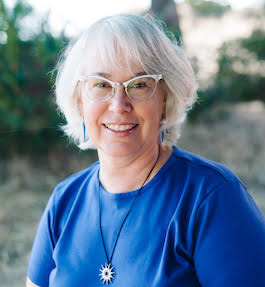
Loren Rhoads
Last year, when all my anchors were suddenly gone—no more writing in the cafe after dropping my kid off at school, no more writing in the car before I picked her up in the afternoon—I really struggled to focus and get anything done. What saved me was my planner stash. I took the planners apart and pulled out all my favorite charts: what were my goals for the year? What writing projects had I started and drifted away from? What markets did I want to pitch articles to? When were my favorite magazines open for story submissions?
sample page from Spooky Writer’s Planner, click to view larger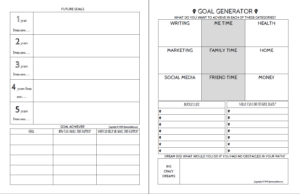
Armed with that information, I made a master to-do list. Everything went on it, no matter how big or small. Which social media did I enjoy using and what was my theory behind my presence there? What were my goals for my newsletter and how could I better connect with my readers there? Since I couldn’t attend the conventions I’d looked forward to, how else could I get my books into the hands of readers?
Once I finally had EVERYTHING noted down, I could see that it was clearly too much for one person to accomplish RIGHT NOW. I used my planner sheets to pull out the little things that I could finish easily. Once I crossed those off my list, I got a jolt of pride that carried me forward to tackle bigger projects.
I made writing dates with friends over Zoom. A writer I knew set up a Tuesday morning chat for her writer friends. I joined Shut Up & Write sessions. I organized Happy Hours and went to writer’s group meetings online. Slowly, my weeks took on some structure. I needed a calendar to keep track of when everything was happening.
I’d published a novel in February (then saw all the conventions I’d planned to attend get postponed or canceled), so with my planner’s help, I managed to put together a blog tour and list of reviewers. After I attended the Bram Stoker Awards online, I was inspired to assemble a collection of my short stories, using what I’d learned from the first blog tour to promote it. Cross that goal off my list!
sample clips from Spooky Writer’s Planner, click to view larger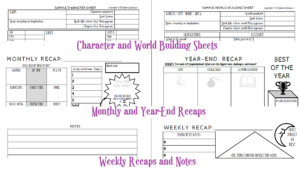
Inspired by my planner, I also did some major reorganization projects in my office, emptying all my file drawers and consolidating my research. I (finally!) assembled a binder of all the contracts I’d signed over my writing career. I made another binder of unfinished stories, so I could see the work ahead of me.
Having projects waiting for my attention made it much easier to deal with the discovery that the nonfiction book I’d been researching didn’t match the book the publisher wanted, one I was unable to write because of a previous contractual obligation. In another time, I would have been spun by the rejection. I would have been lost for months. Instead, because I’d been doing all this work on goals, I quickly shifted gears and began work on what became the third book I published last year. It’s no exaggeration to say that my cobbled-together planner was a lifesaver.
The upshot of this is: there are many planners for writers out there. Some focus on logging your daily word count. Others track the business aspects of being a writer: your income and expenses. Still others concentrate on calculating your available writing time and how to make best use of it. Some combine inspiration with goal-setting. Finding the right planner for yourself may take a couple of tries, but if you find a planner that supports the kind of writer you are and the work you want to do, it can change your life. It is definitely worth the effort.
Check out the Spooky Writer’s Planner that Loren designed with the help of artist EMZ Rich, available through the Wily Writers Gift Shop. Spooky Writer’s Planner
